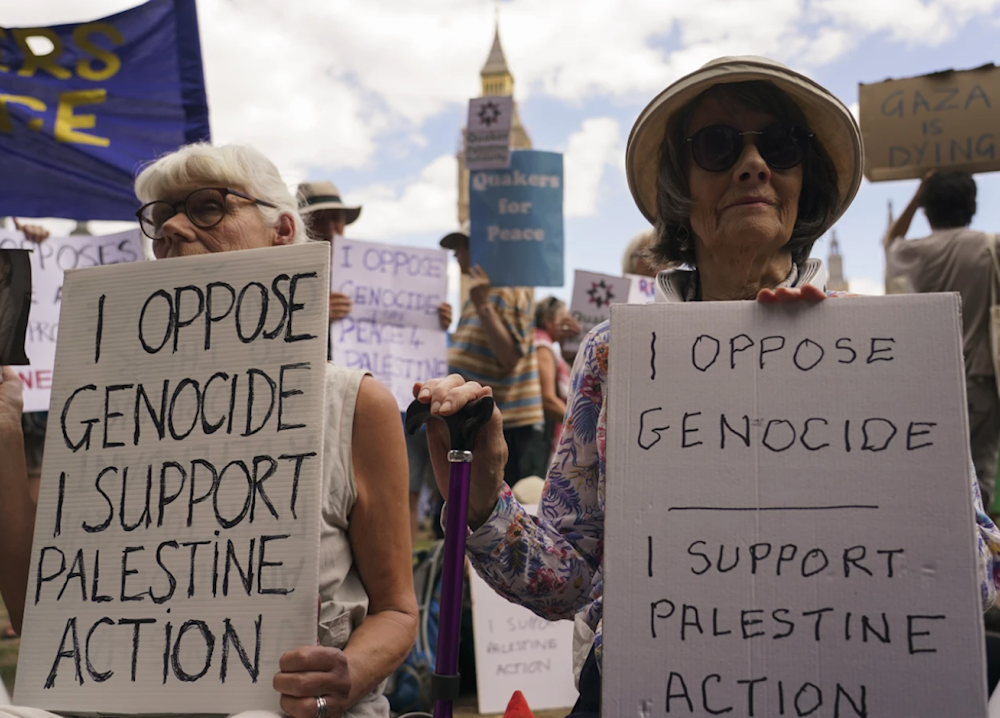Palestine Action's Ammori accuses UK ministers of defamation
Hundreds were detained under terrorism laws in London after a pro-Palestine protest, sparking backlash over the UK's ban on Palestine Action and accusations of government disinformation.
-

Demonstrators hold placards during a protest in support in support of Palestine in Parliament Square in London on August 9, 2025. (AP)
Huda Ammori, co-founder of protest group Palestine Action, which was recently banned in the UK, has accused ministers of spreading false and defamatory claims in an attempt to justify a wave of arrests under the Terrorism Act. Ammori also says the government's intelligence assessments contradict its public justification for the group's proscription.
Over the weekend, 532 people were detained under terrorism laws, half of them aged 60 or older, on suspicion of supporting Palestine Action, triggering widespread concern over the criminalisation of peaceful protest. Images of elderly demonstrators being led away by police and the scale of the arrests have led to mounting pressure on the government to explain its actions.
On Monday, a Downing Street spokesperson claimed Palestine Action had “committed violence, significant injury, [and] extensive criminal damage,” while Home Secretary Yvette Cooper told the BBC the group “is not a non-violent organisation” and that court restrictions were preventing the public from seeing the full extent of its actions.
But Ammori rejected those statements, citing evidence from her ongoing legal challenge against the ban. "Yvette Cooper and No 10’s claim that Palestine Action is a violent organisation is false and defamatory and even disproven by the government’s own intelligence assessment of Palestine Action’s activities," she said.
'Spraying paint is not terrorism'
She pointed to a secret intelligence report produced by the Joint Terrorism Analysis Centre (JTAC) and disclosed in court, which found that "Palestine Action does not advocate for violence against persons’ and that the ‘majority’ of its activities ‘would not be classified as terrorism."
“Spraying red paint on war planes is not terrorism. Disrupting Israel’s largest weapons manufacturer, Elbit Systems, by trespassing on their sites in Britain is not terrorism. It is the Israeli Defense Forces and all those who arm and enable their war crimes who are the terrorists," Ammori said.
JTAC, which operates under MI5, recommended proscribing the group in its March 7 report. While acknowledging that Palestine Action uses disruptive tactics, it noted they generally result in minor property damage and include "graffiti, petty vandalism, occupation and lock-ons."
The activist group Defend Our Juries, which organised Saturday’s protests in support of Palestine Action, also condemned the government's narrative. Court documents cited by the group reveal that Whitehall officials acknowledged the move to proscribe Palestine Action was “relatively novel,” with “no known precedent” of a group being banned for terrorism based primarily on property damage or threats thereof.
A spokesperson for Defend Our Juries accused Cooper of misleading the public, “It is despicable that under political pressure, Yvette Cooper is now actively misleading the British public about the nature of Palestine Action, knowing that if people come to their defence to counter her disinformation, she can have them jailed for 14 years [because they could be deemed to supporting a proscribed group].”
Hundreds plan to join next protest in September
Despite the crackdown, the group said hundreds have already pledged to join the next demonstration, expected to be held in early September on an even larger scale.
Meanwhile, uncertainty hangs over the legal outcomes of the arrests. Tom Franklin, chief executive of the Magistrates’ Association, noted that it may take “days and possibly weeks” for authorities to decide whether to charge those detained. Many cases could be referred to the Crown Court due to the seriousness of the accusations.
One Defend Our Juries spokesperson said they would prefer jury trials in the Crown Court, citing that they trust the British public's judgment on the genocide in Gaza and the UK's role in it.
However, they acknowledged that the justice system may not be able to handle the sheer volume of jury trials. Most charges are expected to be brought under section 13 and likely heard in magistrates’ courts, where the ability to contest the charges is more limited.

 4 Min Read
4 Min Read








